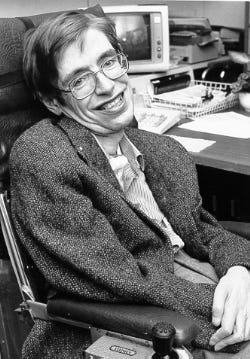Stephen Hawking on the Possibility of Heaven

In 2011, CNN.com published, "Heaven is 'a fairy story,' scientist Stephen Hawking says." The article is brief, and so it does not offer any sustained argument by Hawking against the possibility of an afterlife. In fact, I only found one section that contained anything like an argument against the possibility of the afterlife:
"I regard the brain as a computer which will stop working when its components fail," the physicist said in an interview published Sunday in Britain's Guardian newspaper. "There is no heaven or afterlife for broken down computers; that is a fairy story for people afraid of the dark."
I've frequently heard this type of argument. I first remember encountering it in Bertrand Russell's Why I Am Not a Christian. I read this book during my first year of college, before I had read any serious works of philosophy of religion. Even then, though, I found it to be an unconvincing argument.
His explanation for why our life cannot be revived after death refers only to natural processes. The brain is like a computer, so when its parts fail, it will stop working. A computer that has been smashed into a million bits no longer operates; a brain that has decomposed into a million bits of matter likewise cannot operate. The natural processes does not allow for that.
But this argument doesn't come close to harming the traditional reasons for the afterlife. The traditional belief in the afterlife is based on the existence of a God powerful enough to restore and revive our bodies. God created the world from nothing. A God that powerful can restore my brain even after it has been decomposed. Any "information" lost in the decomposition could be restored. Hawking gives an argument from natural processes to show why the afterlife is not possible, but the traditional reasons are all based upon the supernatural process of God restoring the person's life.
Hawking's argument against the afterlife is as compelling as the argument of someone who, upon hearing me say that I will glue my broken coffee cup back together so it can hold coffee again, tells me that it cannot hold coffee because it is currently in three pieces. But I never claimed that my coffee cup would hold coffee in its broken state. I only said it could after it'd been restored.
Likewise, Christians do not claim that the brain will work in its decomposed state, but that it will work after it has been restored.
Hawking's argument against the possibility of the afterlife is bad and unconvincing. It reflects poorly upon the church that we allow so many Christians to be fooled by such bad arguments.


